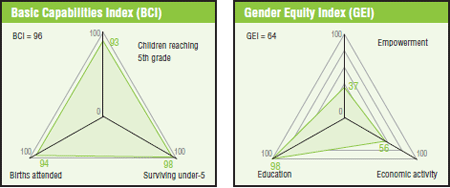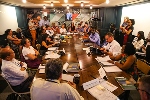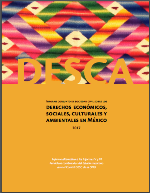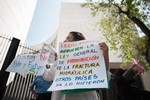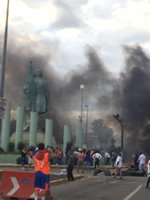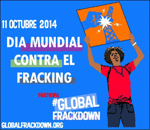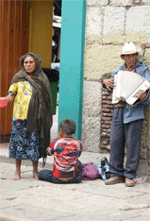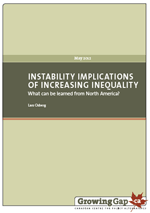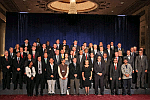Mexico
No progress to date for the SDGs
In March 2018, after examining Mexico’s compliance with the International Covenant on Economic, Social and Cultural Rights (ICESCR), the UN Committee on Economic, Social and Cultural Rights approved among its final observations a recommendation on the priority of human rights and social participation when implementing the 2030 Agenda for Sustainable Development at the national level. The Committee also stressed that the 2030 Agenda and its Sustainable Development Goals are not an end in themselves, but tools for the ultimate goal of realizing human rights, and asked the Mexican State to integrate the final observations into the work of the National Council of the 2030 Agenda. If the Mexican Government takes these recommendations seriously, it could trace an effective implementation route for the 2030 Agenda, but current policies are far from what is needed, as can be seen from the following analysis.
Published on Wed, 2019-01-23 16:08
Human rights are the departure point for the civil society critique of official policies in Mexico. Mexican civil society organizations demand coherence between the 2030 Agenda and governmental policies in economic and energy matters. They claim that the ongoing reform of the energy sector prioritizes business activities of exploration and exploitation of hydrocarbons over any other activity in the territories and without the necessary safeguards that effectively protect water, biocultural heritage, health of people and communities. |
Published on Mon, 2018-07-16 00:00
The experience of Voluntary National Reviews and of Civil Society shadow (or spotlight) reporting. The side event "SDG Implementation at National Level: What’s the Point of National Reports?" was held on July 17 in New York, during the meeting of the High Level Political Forum of the UN. The debate focused on voluntary national reports (VNRs) and parallel “shadow” or “spotlight” reports generated by civil society organizations (CSOs) on progress towards the Sustainable Development Goals (SDGs). |
Published on Thu, 2018-03-08 17:58
In the more than 11 years since Mexico’s last periodic review by the UN Committee on Economic, Social, and Cultural Rights, international scrutiny of the human rights situation in Mexico has centered largely on civil and political rights. However, the human rights crisis in our country also includes a multiplicity of economic, social, cultural, and environmental (“ESC”) rights violations committed by state and non-state actors, through acts and omissions that remain in impunity. In this context, the undersigned civil society organizations and networks submit this Alternative Report to the Committee with the aim of contributing to its important and urgent work in the supervision of the situation of ESC rights in Mexico. The report reflects our collective experience of many years in the investigation, documentation and defense of these rights, and seeks to clarify the current situation in the country, as well as identify key obstacles, setbacks, limitations, and challenges for the full enjoyment of ESC rights. |
Published on Fri, 2017-11-10 16:59
Water is a key concern in Mexico, where 100 civil society organizations submitted a joint report to the UN documenting how “privatization policies benefit extractive industries and mega-projects instead of reducing inequalities in access to essential services”. Users with difficulties in paying the increased tariffs are being denied their human right to water and the quality of the water distributed has deteriorated so much in many places that in Aguascalientes 95 percent of the water people drink is bottled. The report points out that water issues affect women disproportionately. “When there is a shortage, irregular delivery or bad quality water, women spend more time to bring water to their homes, boil it, filter it and deal with the authorities, frequently adding up to 30 hours a week to their domestic work.” The Mexico Social Watch report emphasizes that “insufficient and ineffective regulations on environmental and social impact, have led to numerous cases of violation of fundamental rights due to business activities”. |
Published on Fri, 2016-07-22 18:59
The Mexican legal framework on energy amended in 2013 and 2014 presents obstacles to the exercise of human rights as well as to achieving the SDGs, as it prioritizes the activities of exploration and exploitation of hydrocarbons "over any other involving the use of the surface and subsurface of the lands concerned". The framework establishes several legal provisions such as the determination of legal easements for hydrocarbons to public, private, national and transnational energy projects (some of which employ harmful techniques such as hydraulic fracturing or fracking), which constitutes a regression in terms of human rights and the environment, while seriously compromising the achievement of the SDGs. |
Published on Tue, 2016-06-21 14:46
Last June 19th, we have been witnesses of the extremely violent actions of the Mexican State repressing the teachers and the organized civil society in resistance in different areas of the State of Oaxaca including the Istmus of Tehuantepec, Nochixtlán and the city of Oaxaca. As a result of the excessive use of force, at least six persons have lost their lives and dozens have been injured and arrested. At this moment there is no information about the whereabouts of the arrested persons neither there is an exact total number of injured and killed persons. Medical attention was not guaranteed and civil society had to create points of emergency medical attention to injured persons without being able to cope with the demand. There are happening particularly violent actions in the city of Oaxaca tonight. We have witnessed the arrival of a large number of airplanes of the Federal Police and the Gendarmerie in the city throughout the day as well as we witness that the tension is increasing every minute. |
Published on Fri, 2014-10-17 08:26
Fracking will have disastrous consequences for the environment, the population and the energetic sustainability of Latin America and this development cannot be allowed. In connection with the World Day against Fracking (Global Frackdown) Latin-American civil society organizations have pointed at the irreversible impacts of fracking at the territories and populations of these regions by the exploitation of hydrocarbons. |
| Published on Fri, 2013-02-22 06:11 |
Published on Thu, 2013-02-21 20:00
The 2010 Progress Government Report on the MDGs in Mexico emphasizes that most of the indicators associated with the MDGs and their goals have significantly improved, claiming to have met most of them and anticipating the rest would be met by 2015. Despite the progress, the report indicates that there is still a long way to go: income inequality and living conditions of poverty and vulnerability in many families still persist; it is necessary to reduce maternal mortality and consolidate gender equality; the vital challenge of environment and higher economic growth is still unsolved. |
Published on Mon, 2012-05-28 14:42
An examination of income inequality in North America reveals that Mexico is the only part of the continent where the middle class has been gaining from growth, according to a new study by economist Lars Osberg, Dalhousie University professor and CCPA Research Associate. |
Published on Thu, 2011-09-22 13:04
Sources: Transparency International, Financial Task Force, HumanRights.gov, Inesc
A group of government and civil society organizations from all over the planet, among them the Instituto de Estudos Socioeconômicos (Inesc, focal point of Social Watch in Brazil), launched this Wednesday in New York the Open Government Partnership (OGP), a multilateral initiative that aims to promote transparency, fight corruption, strengthen accountability and empower citizens. |
|
Published on Wed, 2006-05-10 14:15
On May 1st 2006 Areli Sandoval presented at the UN Committee on ESCR in Geneva the Report on behalf of the Promoting Group of the Alternative Report on Economic, Social, Cultural and Enviromental Rights. |
|
Published on Fri, 2006-05-05 16:36
See the document prepared by Areli Sandoval Terán for her oral intervention before the ESCR Committee in Geneva last May 1, 2006. |
|
Published on Wed, 2006-03-15 13:43
As part of the Rallies in the Defense of Water, COMDA, together with international organizations, is organizing the International Forum in the Defense of Water from the 17th to the 19th of March in the Sindicato de Telefonistas de la República Mexicana (Villalongín 50, Col. Cuauhtémoc). |
SUSCRIBE TO OUR NEWSLETTER

